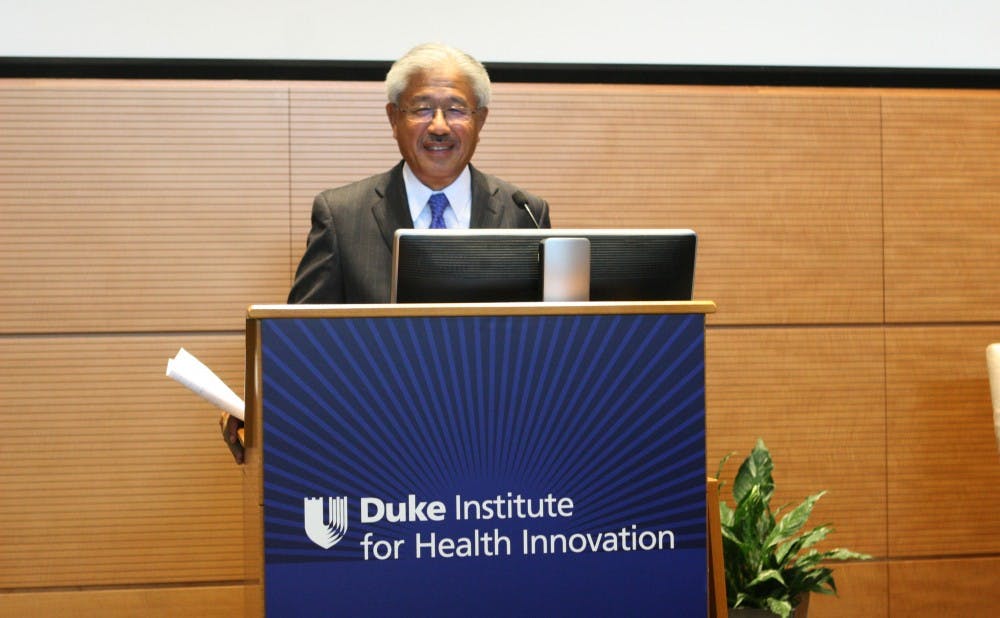The IOM, which provides healthcare recommendations and scientifically informed analysis on public health care delivery and quality, is widely regarded as a primary adviser to policymakers, health professionals and the public. Dzau, who will be succeeding the current IOM president Dr. Harvey Fineberg, will assume his new position beginning July 1. Dzau said that working with IOM will allow him to help make a difference by tackling critical issues in healthcare and biomedical services on a larger scale.
“I’ve been at Duke for almost 10 years, and it’s been the best 10 years of my life,” Dzau said. “The issues we tackle at Duke are part of the larger picture both national and globally. At the IOM, I’ll be able to address these issues at the national level.”
During his time as CEO and chancellor, Dzau has formed synergies between research, education and clinical care by implementing the Duke Cancer Institute, Duke Translational Medicine Institute and a system-wide electronic medical records system across the Duke University Health System. Dzau has also helped form Project Access of Durham County, a community care system that aids specialty care needs of local patients.
Michael Schoenfeld, vice president for public affairs and government relations, said that Dzau’s energy and creativity has led DUHS during a period of transformation both in healthcare generally and at Duke, with the multiple new medical centers that have been created. Schoenfeld believes that Dzau’s engagement has improved DUHS' presence as a major influence in American healthcare.
“Victor has been a great citizen of the University,” Schoenfeld said. “While his job was chancellor of the health system, chancellor for health affairs and CEO of the health system, he has been really deeply engaged in the life of the University and of the community and will certainly leave a strong legacy in both those areas."
In addition to the contributions he made towards expanding the medical center, Dzau also worked hard to preserve the quality of pre-existing aspects of the health system. Dzau navigated DUHS through several difficult moments, such as the Anil Potti scandal, in which a cancer researcher fabricated findings, and more recent national budget cuts as a result of the federal government sequester. Through this time, he kept Duke’s health system nationally ranked, with the School of Medicine consistently ranking top 10 in the country in U.S. News & World Report.
Dzau has also been involved with the World Economic Forum and the creation of the Duke-National University of Singapore Graduate Medical School, and Schoenfeld believes Dzau’s strong qualifications will help expand his work at not only the national but also the international level.
“He comes to that position with a very high profile and a great network, and I expect that the Institute of Medicine, which is already an important player in the development and analysis of health policies and medical research policies and activities, will become only more active and more visible,” Schoenfeld said.
Dzau, now 67, noted that Duke does not have a mandatory faculty retirement age. He added that regardless of his new position, he had no plans to retire, and it was certainly not a factor in his decision to make the move.
“Actually, [President Richard] Brodhead and I had a meeting and we were considering extending my term here, but this new opportunity was too good to pass up,” Dzau said.
Dzau thinks that his experience at the IOM will have a much different focus than at Duke, where local issues such as the daily management of patients are more prevalent.
“In the IOM, there will be opportunities to be thinking about what are the critically important issues we face in health and medicine and how to make the right analytics so we can influence the direction of areas of research,” he added.
Dzau’s accepting his new position at the IOM leaves an open position within the medical center, for which Brodhead will have to find a replacement.
“Victor Dzau and I have had a very close working partnership, which was not always the case in past Duke history. We confer at length at least every week, and have shared thoughts on every important issue,” Brodhead wrote in an email Wednesday. “Since Victor was both Chancellor and CEO, there's only one position vacant. We will find someone terrific.”
Regardless of who succeeds him, Dzau said he has faith in the health system he is leaving behind.
“I don’t want to say that I’ve left it in great shape…but it’s well prepared for the future, which has lots of challenges given changes in the healthcare environment and funding,” he said. “But if I had to pick one institution, I’d still bet on Duke because we have the best people and the best resources around.”
Dzau said he does not take sole credit for any of the accomplishments at DUHS during his time, citing his collaboration with the Duke community as the driving force behind the advances.
“All the achievements I’ve made [at Duke] were possible because of the work done by others, so the greatest achievement for me is to work with such wonderful, talented and devoted people,” he said. “Everything else like the Cancer Center and the electronic medical records system was all done through those people.”
Get The Chronicle straight to your inbox
Signup for our weekly newsletter. Cancel at any time.

